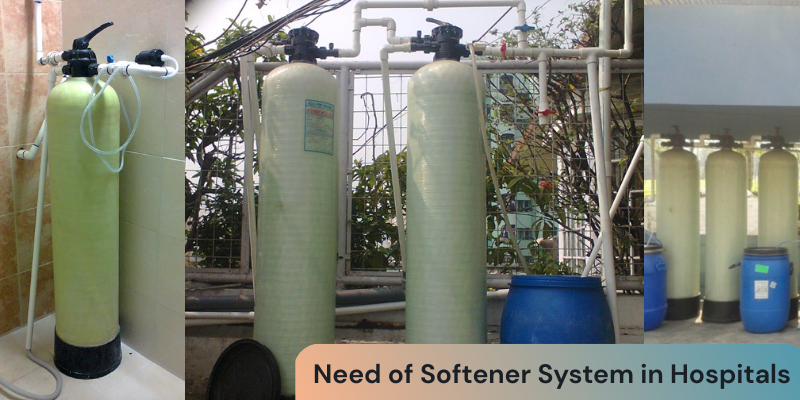
By admin
Posted on June 14, 2025
Introduction: Why Water Matters More Than You Think in Hospitals
Water plays a big role in every hospital, from cleaning surgical tools to washing bed sheets. But not all water is the same. “Hard water” – water with high levels of calcium and magnesium – can create serious problems. These minerals may not harm people directly, but they can damage machines, reduce cleaning quality, and even affect patient comfort. That’s why more hospitals today are choosing to install water softener systems — to protect their equipment, staff, and most importantly, their patients.
There are several strong reasons why hospitals need a water softener system:
1. Protecting Expensive Equipment
Hospital machines like sterilizers, dialysis units, and laundry machines are costly. Hard water causes scale buildup, which damages these devices over time. Soft water helps avoid these problems and keeps machines running longer.
2. Better Cleaning and Hygiene
Hospitals need the highest level of cleanliness. Soft water helps soaps and disinfectants work better, making it easier to remove dirt and bacteria. This leads to a safer and more hygienic environment for everyone.
3. Preventing Plumbing Issues
Hard water causes mineral buildup in pipes and fixtures. Over time, this leads to blocked pipes, slow water flow, and expensive repairs. A water softener protects the hospital’s entire plumbing system.
4. Comfort for Patients and Staff
Soft water feels better on the skin and doesn’t leave residue on clothes or linens. This is important in hospitals, where patient comfort and hygiene are top priorities.
5. Boosting Energy Efficiency
Softened water improves the performance of heating and cooling systems. These systems work more efficiently, use less energy, and need fewer repairs — all of which help reduce hospital running costs.
6. Protecting Medical Instruments
Medical tools, especially sensitive ones like surgical equipment, must be perfectly clean and free from mineral buildup. Soft water helps keep them in top condition and ensures accurate performance.
7. Supporting Infection Control
Hospitals work hard to prevent infections. Soft water improves sterilization and cleaning, which helps lower the risk of infections spreading in the hospital.
8. Meeting Quality and Legal Standards
Hospitals must meet strict health and safety regulations. A water softener system helps ensure they stay compliant by maintaining high water quality.
9. Promoting Sustainability
Soft water requires less detergent and cleaning products. This reduces chemical waste and supports eco-friendly hospital practices.
Let’s look at how a water softener system works in a hospital setting:
1. Water Analysis and Assessment
First, water experts test the hospital’s water to check the level of hardness. Based on this, they plan the best treatment method.
2. System Design and Setup
Engineers design a system that fits the hospital’s water usage and space. Every hospital is different, so the softener is tailored to match its specific needs.
3. Pre-Treatment Filtration
Before softening, the water goes through filters to remove dirt and particles. This step protects the softening equipment and keeps it working smoothly.
4. Ion Exchange Softening
This is the core part of the process. The water passes through a resin bed, where hard minerals like calcium and magnesium are swapped with sodium ions. This makes the water soft and safe for hospital use.
5. Regeneration Cycle
Over time, the resin becomes full of hard minerals. The system then uses a saltwater solution to clean the resin and restore its softening power.
6. Monitoring and Control
Smart systems watch over the water flow and quality in real-time. If needed, they adjust the process automatically to keep everything running efficiently.
7. Water Quality Testing
After softening, the water is tested to make sure it meets safety and quality standards. This is very important in hospitals where clean water is critical.
8. Regular Maintenance and Support
The system includes remote monitoring and easy diagnostics. Regular checkups and support ensure it keeps working without interruptions.
Installing a water softener system in a hospital is not just about preventing damage — it’s about creating a cleaner, safer, and more efficient environment for patients and staff. It protects valuable equipment, reduces operating costs, and supports infection control. In today’s healthcare world, where every detail matters, softened water plays a quiet but powerful role in delivering better care.
By investing in a softener system, hospitals are not only protecting their infrastructure but also showing commitment to patient well-being, hygiene, and sustainability.